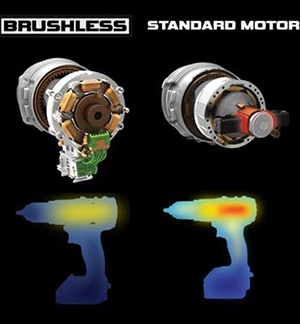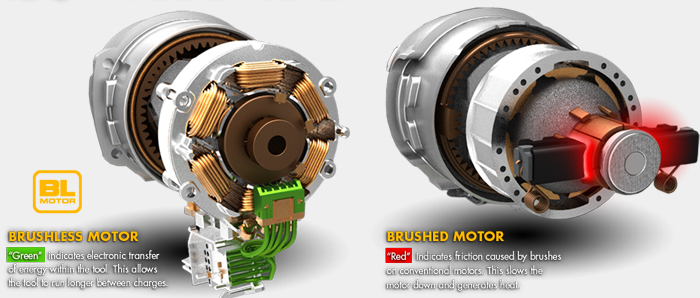Are brushless power tools better than brushed? That’s the burning question on the minds of many DIY enthusiasts and professionals alike. If you’ve ever found yourself torn between the two options, fret not! I’m here to break down the pros and cons in a way that won’t make your head spin.
Now, you may be wondering, what’s the big deal? Well, my friend, power tools are an essential part of any handy person’s arsenal, and choosing the right type can significantly impact your projects. So, let’s dive in and explore the differences between brushless and brushed power tools, and figure out which one reigns supreme.
Let’s start by taking a closer look at brushed power tools, the tried-and-true workhorses that have been around for quite some time. These tools use carbon brushes to conduct electricity, which in turn powers the motor. While they get the job done, brushed power tools have a few downsides that may make you think twice about investing in them.
When it comes to power tools, brushless models are often considered superior to brushed ones. Here are some reasons why:
1. Greater Efficiency: Brushless motors provide more power and run more efficiently, resulting in longer battery life.
2. Increased Durability: Brushless tools have fewer moving parts, reducing wear and tear.
3. Enhanced Performance: Brushless motors offer higher torque and speed for improved performance.
4. Quieter Operation: With no brushes, brushless tools produce less noise during operation.
5. Smoother Operation: Brushless motors deliver smoother and more precise results.
Overall, brushless power tools are a worthwhile investment if you’re looking for better performance, durability, and efficiency.

Are Brushless Power Tools Better Than Brushed? An In-depth Comparison
Brushless and brushed power tools are both widely used in various industries and applications, but there has been an ongoing debate over which one is better. In this article, we will delve into the world of power tools to understand the key differences between brushless and brushed motors, their advantages and disadvantages, and ultimately determine which one is superior.
Advantages of Brushless Power Tools
Brushless power tools have gained immense popularity in recent years due to their numerous advantages. One of the key advantages is increased efficiency. Unlike brushed motors that rely on brushes for transferring electrical current to the spinning commutator, brushless motors use electronic sensors to control the flow of electricity. This eliminates the need for brushes and results in less energy loss, making brushless power tools more efficient.
Another significant advantage of brushless power tools is their longer lifespan. Since there are no mechanical brushes that wear down over time, brushless motors tend to last longer when compared to their brushed counterparts. This makes brushless power tools a cost-effective investment in the long run.
Brushless power tools are also known for their compact size and lighter weight. Since the commutator and brushes are eliminated, brushless motors can be designed to be smaller and lighter without sacrificing power. This makes brushless power tools more comfortable to use and reduces operator fatigue, especially during long hours of work.
Disadvantages of Brushless Power Tools
While brushless power tools offer several advantages, they do have a few drawbacks. One of the main disadvantages is the higher cost. Brushless power tools tend to be more expensive than their brushed counterparts. However, considering their efficiency, longevity, and performance, the higher upfront cost can be justified in terms of long-term savings.
Another disadvantage is the complexity of brushless motors. Due to the presence of electronic sensors and more intricate circuitry, brushless power tools require more advanced technology and components, which can make repairs and maintenance more challenging. However, as brushless technology continues to evolve, this disadvantage is becoming less significant.
Lastly, brushless power tools may require specialized batteries. Brushless motors operate at higher voltages, which means they often require specific high-capacity lithium-ion batteries. While these batteries offer improved performance and longer runtimes, they can be costly to replace and may not be compatible with other tools in a user’s tool collection.
Brushed Power Tools Vs. Brushless Power Tools: A Comparison
When comparing brushed and brushless power tools, it’s essential to consider various factors to determine which one is better suited for specific applications.
Power and Performance
Brushless power tools generally deliver superior power and performance compared to brushed power tools. The electronic control in brushless motors allows for optimized power delivery, resulting in increased torque and faster rotation. This makes brushless power tools more efficient for heavy-duty applications and tasks that require precise control.
On the other hand, brushed power tools are known for their reliability and consistent performance. While they may not be as powerful as brushless counterparts, brushed power tools still offer sufficient power for everyday tasks and are often more affordable.
Battery Life and Efficiency
Brushless power tools are renowned for their exceptional energy efficiency, resulting in longer battery life. The elimination of brushes reduces friction and energy loss, allowing brushless power tools to operate at maximum efficiency. This translates to more work done on a single battery charge, making brushless tools ideal for professionals who require extended use without frequent battery changes.
Brushed power tools, while less efficient, can still offer respectable battery life. However, the brushes and commutator in these motors contribute to energy loss and may require more frequent battery replacements during intensive use. For occasional DIYers or light-duty tasks, brushed power tools can be a cost-effective option.
Durability and Lifespan
When it comes to durability and lifespan, brushless power tools have a significant advantage over brushed counterparts. With no brushes to wear out, brushless motors can endure more consistent and demanding use without experiencing motor failures. This makes them ideal for professional tradespeople who often rely on their tools day in and day out.
Brushed power tools, while not as durable as brushless tools, are still capable of withstanding regular use. However, due to the brushes’ mechanical wear, they may require periodic maintenance and replacement, especially in high-demand applications. DIYers or occasional users can benefit from the affordability and reliability of brushed power tools.
Conclusion
When it comes to choosing between brushless and brushed power tools, the decision ultimately depends on the user’s specific needs and budget. Brushless power tools offer superior efficiency, longer lifespan, and increased power, making them the top choice for professionals who require high performance and durability. On the other hand, brushed power tools are more budget-friendly and suitable for occasional users or DIYers who do not require the same level of power and longevity.
Whichever option you choose, both brushless and brushed power tools have their own merits and can serve their purpose effectively. It’s important to consider the intended use, application requirements, and budget constraints when making a decision. By understanding the differences and weighing the pros and cons, you can make an informed choice that aligns with your specific needs and ensures optimal performance in your tasks.
Key Takeaways: Are Brushless Power Tools Better than Brushed?
1. Brushless power tools are generally more efficient and have longer run times compared to brushed power tools.
2. Brushless power tools produce less friction, reducing wear and tear and increasing the overall lifespan of the tool.
3. Brushless power tools deliver consistent power output, providing better performance and more precise control.
4. Brushless power tools are typically lighter and more compact, making them easier to handle and maneuver.
5. Brushless power tools are generally more expensive than brushed power tools, but the benefits they offer often outweigh the higher cost in terms of improved performance and durability.
Frequently Asked Questions
Are brushless power tools better than brushed?
1. What are the main differences between brushless and brushed power tools?
In brushed power tools, a brush and commutator are used to transfer electrical current to the motor. This creates friction, leading to wear and tear, and ultimately reducing the tool’s efficiency and lifespan. On the other hand, brushless power tools use electronic circuitry instead of brushes, eliminating friction and improving overall performance.
Brushless power tools also tend to have more precise control, increased power output, and longer battery life compared to their brushed counterparts.
2. Do brushless power tools deliver more power and torque?
Yes, brushless power tools typically provide more power and torque than brushed tools. The brushless motor design allows for higher energy conversion efficiency, which means more power is being effectively utilized for the intended application. This can result in faster and more efficient completion of tasks.
Additionally, brushless power tools often have adjustable speed settings, allowing users to fine-tune the tool’s power output to suit different projects.
3. Are brushless power tools more durable?
Yes, brushless power tools are generally more durable than their brushed counterparts. By eliminating brushes and commutators, brushless motors experience less wear and tear, which leads to a longer lifespan. The absence of physical contacts in the motor also reduces the risk of internal damage caused by friction or mechanical failure.
Furthermore, brushless power tools are less prone to overheating, as the electronic circuitry can regulate power and temperature more efficiently. This helps prevent damage due to excess heat during prolonged use.
4. Are brushless power tools more expensive?
Initially, brushless power tools may have a higher price tag compared to brushed tools. This is because the technology used in brushless motors is more advanced and typically more expensive to produce. However, the long-term benefits of brushless power tools outweigh the initial cost.
In addition to their durability and increased performance, brushless power tools often have longer battery life, reducing the need for frequent replacements. This can result in cost savings over time.
5. Can I use the same battery for both brushless and brushed power tools?
In most cases, batteries used in brushed power tools are not compatible with brushless power tools and vice versa. This is because the different motor designs require different voltage and current specifications.
It is important to check the manufacturer’s recommendations to ensure that you are using the correct battery for your power tool. Using an incompatible battery can lead to subpar performance or even damage the tool.

Summary
So, are brushless power tools better than brushed? It depends on what you need. Brushless tools are more efficient, last longer, and have more power. But they are also more expensive. If you’re a professional or need to tackle big projects, brushless tools might be worth the investment. However, if you’re a casual DIYer, brushed tools can still get the job done at a more affordable price. Ultimately, it’s about finding the right tool for the right job.
